John Jinks and the collapse of the Fifth Dail
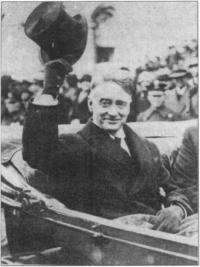
Cathal Brennan on a moment in 1927 in which Irish history failed to turn.
On the 16th of August 1927, the opposition of the Labour party and the republicans of Fianna Fail, along with a number of smaller parties, proposed a motion of no confidence in the pro-Treaty Cumann na nGaedheal government.
The vote was a result of the first general election in the Irish Free State after the Civil War of 1922-23. The election in August 1923 had occurred against a background of martial law and with most anti-Treaty candidate imprisoned. This was the first real peaceful challenge to the victors of the Civil War.
The election of June 1927 produced the fifth Dáil, which sat for only 98 days and was the shortest Dáil in history. It was also one of the most historic; during its term Fianna Fáil abandoned abstentionism and finally took their seats in Leinster House. It was calculated that the opposition had one more vote than the government, which would lead to the formation of a new government led by Labour Leader Thomas Johnson.
But one Deputy, John Jinks of the National League, disappeared just as the votes were being cast. The vote was tied and the government survived by the narrowest of margins. Jinks action, or rather inaction, for a time changed the course of Irish History.
The Boundary Commission and the Vulnerability of Cumann na nGaedheal
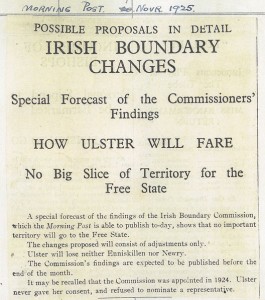 Since the general election of 1922, the second largest political party in the state, Sinn Féin, political representatives of the Anti-Treaty IRA, defeated in the Civil War over the Treaty, had refused to take their seats in the Dáil, in opposition to the Anglo – Irish Treaty. One of the main issues that convinced the Sinn Féin leader, Éamon de Valera, to reconsider his party’s abstention from the Dáil was the controversy surrounding the report of the Boundary Commission.
Since the general election of 1922, the second largest political party in the state, Sinn Féin, political representatives of the Anti-Treaty IRA, defeated in the Civil War over the Treaty, had refused to take their seats in the Dáil, in opposition to the Anglo – Irish Treaty. One of the main issues that convinced the Sinn Féin leader, Éamon de Valera, to reconsider his party’s abstention from the Dáil was the controversy surrounding the report of the Boundary Commission.
The commission was included in Article 12 of the Anglo – Irish Treaty which dealt with a proposal to redraw the boundary between the Irish Free State and Northern Ireland if the Northern Ireland parliament decided not to come under the control of the new Free State parliament in Dublin. The article stated that the border would be redrawn ‘… in accordance with the wishes of the inhabitants, so far as may be compatible with economic and geographic conditions.’ The outbreak of the Civil War (1922-23) meant that the commission did not begin to meet until late in 1924.
The Boundary Commission was expected to transfer larges parts of Northern Ireland to the Irish Free State. Instead in 1925 it proposed giving parts of Monaghan and Donegal to Northern Ireland.
On the 7th of November 1925 the London Morning Post published the likely findings of the commission. The Free State was to gain some small areas of Fermanagh and Armagh while Northern Ireland would gain a portion of eastern Donegal and Monaghan. The report unleashed a storm of controversy throughout nationalist Ireland. The Free State representative on the commission, the Minister for Education Eoin MacNeill, resigned from the commission and from the cabinet.
Most nationalists had believed that all of Tyrone and Fermanagh would be transferred to the Free State along with south Armagh, south Down, Derry City and parts of south county Derry. The idea that the Free State would actually lose territory was unthinkable.
The President of the Free State Executive Council, William T. Cosgrave, went to London on the 25th of November for an urgent meeting with the British Prime Minister, Stanley Baldwin. Within 48 hours another delegation led by Kevin O’Higgins was in London. The Minister for Industry, Patrick McGilligan, warned the British that if they were to return to Dublin with the present settlement they would ‘disappear politically’ and the entire Treaty settlement would be in jeopardy.[1]
On the 3rd of December, an agreement was reached between the British, Free State and Northern Ireland governments. The Boundary Commission report was suppressed and the border would remain as it was. The Free State would assume responsibility for the cost of the Anglo-Irish war and would pay compensation for ‘malicious damage’ in the period from the truce to the end of the Civil War while other clauses provided for the continued payments of land annuities to the British government and the transfer of Council of Ireland powers to the Northern Ireland government. The Free State secured some concessions regarding Article 5 of the Anglo – Treaty which committed the Free State to a share of the UK’s national debt.[2]
Ending abstentionism and the birth of Fianna Fáil
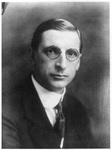
Despite Cosgrave’s assertion that the agreement was ‘a damn good bargain’, the reaction among the public was one of anger. Even Eoin MacNeill wondered why the Free State government couldn’t wring greater concessions from the British regarding land annuities and the treatment of Catholics in the North considering the apparently strong hand they had going into the negotiations in London.[3]
Pressure began to be brought on de Valera and his colleagues in Sinn Féin to enter the Dáil and vote against the Agreement. Even Austin Stack, one of the staunchest abstentionist TDs, toyed with the idea of entering Leinster House. In a letter to de Valera he wondered whether enough support could be gained among Republican TDs ‘oath and all’ to defeat the London Agreement and bring the Free State to an end.[4]
On the 7th of December, the Labour Party leader, Thomas Johnson, invited all elected TDs to a meeting in the Shelbourne Hotel to try and find some way to block the agreement. Addressing his TDs de Valera stated, ‘I welcome the opportunity which I hope the meeting will afford of reuniting the people of all parties throughout the country in effective opposition to partitioning our motherland.’[5]
Sinn Féin declined the Labour Party’s request to enter the Dáil and, even if the 48 Sinn Féin TDs had voted against the Agreement, it would still have been passed as the final vote was 71 to 20 with 14 abstentions. De Valera was right to be cautious as there were deep tensions within the Republican movement over the issue of sitting in Dáil Éireann. Just over two weeks earlier the IRA had severed its connection with Sinn Féin after Frank Aiken had admitted the party was considering entering Leinster House.[6]
The public was angered by the Cosgrave’s government’s perceived surrender on partition and Eamon de Valera used the opportunity to form a new Republican party, Fianna Fail and to enter the Dail.
In January 1926 de Valera announced that he would favour entering the Dáil if he wasn’t required to take the oath. This led to an extraordinary general meeting of Sinn Féin on the 9th of March where he proposed that, ‘Once the admission oaths of the twenty – six and six – county assemblies are removed it becomes a question not of principle but of policy whether or not Republican representatives should attend those assemblies.’
The motion was defeated by 179 votes to 177 with 85 abstentions. In response de Valera told the meeting that, ‘I am from this moment a free man… My duty as President of this organisation has ended.’ On the 16th May de Valera and his supporters launched a new party, Fianna Fáil, in the La Scala Theatre in Dublin.
The results of the general election of the 9th of June 1927 were inconclusive. The government party, Cumann na nGaedheal, were reduced to 46 seats while the main opposition party, Fianna Fáil, followed closely behind on 44. The arithmetic of the Dáil meant Cumann na nGaedheal would continue in power as a minority government because Fianna Fáil and Sinn Féin (five seats) were still abstaining from the Dáil.
The new Dáil met for the first time on the 23rd of June. A huge crowd had gathered outside Leinster House as de Valera presented the clerk of the Dáil, Colm Ó Murchadha, with a legal opinion stating that he and his fellow Fianna Fáil TDs could not be excluded from taking their seats even if they refused to take the oath.[7] This failed to satisfy Ó Murchadha and de Valera withdrew.
The O’Higgins assassination and political crisis in the Free State
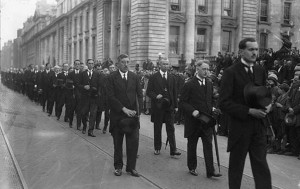
On the 10th of July the Vice – President and Minister for External Affairs, Kevin O’Higgins, was assassinated by three members of the IRA. O’Higgins had been a particular hate figure for republicans since the Civil War, due to his vociferous advocacy of executions. The killing led the government to bring in a new Public Safety Act and the Electoral Amendment Act.
The former reintroduced powers of internment and execution that had been in force during the Civil War. The latter would require every candidate to sign an affidavit stating that he or she would take their seat in the Dáil and sign the oath if elected or face disqualification.
Kevin O’Higgins was assassinated in 1927 and the resultant repressive legislation passed by the government forced Fianna Fail to take the Oath of Allegiance to the Free State constitution and the British monarch or lose their seats.
This law presented Fianna Fáil with the alternative of taking their seats or losing them altogether. Referring to the oath as an ‘empty formula’ the party finally signed the register and took their seats in the Dáil.
Following Fianna Fáil entry into the legislature the continuance of Cosgrave’s government now became precarious. After negotiations between the three main opposition parties it was agreed that Fianna Fáil would support a minority government made up of the Labour Party and the National League Party with the Labour leader Thomas Johnson as President of the Executive Council (Taoiseach). In return for this, an immediate referendum on the oath would be held.
The National League was led by Captain William Archer Redmond, the son of the former leader of the Irish Parliamentary Party John Redmond. The party was a coalition of supporters of the old Nationalist Party, ex – British servicemen, licensed vintners, former unionists and other supporters of the Treaty who were not aligned with Cumann na nGaedheal. At the general election they had won eight seats.
On the 16th of August the Fianna Fáil deputies took their seats and Thomas Johnson moved the motion of no confidence. He opened the debate by castigating the government’s social and economic policies and then moved onto to the emergency legislation brought in by the government in the wake of the O’Higgins’ assassination.
It seemed to us that they were not likely to lead to better order, to better government, and to greater promise of peace, but that, on the contrary, the introduction and carrying through this House of those Bills rather indicated a state of mind in the Executive Council which was more likely to lessen the prospects of good order and good government than to improve them.
Ministers told us in that discussion that they had no desire to retain office, and that they recognised that the country had decided that they were a minority and had not given them sufficient support to warrant them in maintaining office if any alternative could be found. To-day there are a number of alternatives. The fact that the Deputies of Fianna Fáil are in the House provides the obvious alternative.[8]
William Redmond of the National League also viewed the government’s repressive legislation as a reason to remove them from office.
We, here on these benches, object to seeing our Government perpetrating the stale old blunder of attacking the legitimate exercise of constitutional rights and political action under the pretext of seeking to suppress or to prevent crime… But even the British Government, with all its difficulties, never passed so drastic a Coercion Bill as the present Public Safety Act, and, as far as I can learn, they passed over forty Bills of a similar kind.
That …brings the country and the State into odium and contempt with the people who suffer from the tyranny of unconstitutional repression. But in this case it bears all too much the complexion of one set of political partisans who have attained to office using the emergency powers of the State for the purpose of suppressing their rival partisans who have not succeeded in getting there.[9]
Opposing the motion, Patrick Baxter, the Farmers’ Party TD for Cavan, denounced the National League for proposing to replace Cumann na nGaedheal with a government led by the Labour Party and his speech indicates the anxieties that large farmers and graziers still felt at the prospect of radicalism by the rural working classes.
Let Deputy Redmond ask the farmers who are his constituents what they think of this alliance. If Deputy Redmond wants to hear a little more about the policy the Labour Party applied in this country in the past, let him go down to Tipperary where a very peculiar combination flew the red flag for four or five months over the creameries in that county. For four or five months the farmers were unable to sell their milk. It was spilled out the doors. Butter made out of milk, for which the farmers were never paid, was brought up here to Dublin. Was it brought to some of the offices in Dublin? How much of that policy was the Labour Party in this country behind?[10]
The idea of replacing Cosgrave with Johnson, who was born in Liverpool and didn’t move to Ireland until he was in his twenties, was too much for some deputies, such as the Independent John O’ Hanlon. ‘I bear animosity to no man. I am an extremist in nothing, but I am an Irishman, and I cannot possibly give my vote to put at the head of this State an Englishman.’[11]
The Vote of no confidence
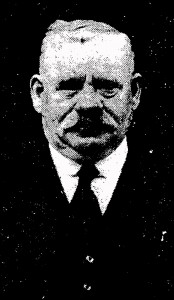
Not all of the National League TDs agreed with the idea of a new coalition supported by Fianna Fáil. Vincent Rice resigned from the party over the issue and stated during the debate that, ‘I do not think that Deputy de Valera has ever disguised that his aim is to get rid of the Treaty and the Constitution, and if he is not serving that purpose by keeping Deputy Redmond in office, how many hours will he keep him there?’ He pointed out that the new government would not, ‘last one hour except, and so long as, it obeys the behest of Deputy de Valera and his party.’[12]
As the party whips and commentators had crunched the numbers earlier it seemed a forgone conclusion that the government would be defeated by 72 votes to 71. With the debate at a close, the Ceann Comhairle, Michael Hayes, put the motion to the Dáil. The supporters of the motion called out Tá while the opponents shouted Níl. Hayes rose to announce that the motion had been carried and the government had been defeated. The Cumann na nGaedheal minister Patrick McGilligan called for a division on the vote.
The Labour Party and the National League proposed the vote of no confidence, in the government because; ‘one set of political partisans who have attained to office using the emergency powers of the State for the purpose of suppressing their rival partisans who have not succeeded in getting there’
As tellers were organised and TDs prepared to troop through the Tá and Níl lobbies it was noticed that the National League TD, John Jinks, was nowhere to be seen. He had been sitting behind Redmond earlier during the debate and opposition TDs began to scour the building for him but he could not be found.
A hush fell on the Dáil as the tellers delivered their votes. The Ceann Comhairle stated that the motion was tied at 71 votes apiece and it was his duty to cast his deciding vote for the government. The government benches and their supporters in the visitors’ gallery erupted into cheers as the opposition appeared completely bewildered by the turn of events.[13]
Cosgrave rose to his feet to propose that the Dáil would adjourn until the 15th of November but this was revised to the 11th of October. Cumann na nGaedheal had survived but they still faced the prospect of two upcoming by – elections in Dublin. The question now was where Deputy Jinks had disappeared to and why had he not voted on the motion.
The strange case of Deputy John Jinks
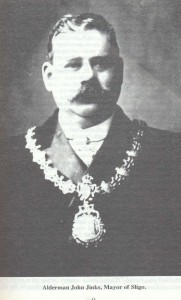
Jinks was a publican, an auctioneer, an iron monger and funeral director. He had been a mainstay of local politics in Sligo town for many years, as a member of the corporation and then as Mayor on several occasions. He had been a member of the Irish Parliamentary Party and then an independent before joining the National League. Jinks was heavily involved in recruiting local Sligo men to the British Army during the First World War and retained a political base among ex – servicemen in the county.[14]
When approached by journalists that evening Captain Redmond told the media that;
The substantial result, the moral result, is satisfactory. The Government policy of violent repression must obviously be laid aside, since such extreme and highly contentious policies cannot be carried through by the Governments whose very existence depends on the Chairman’s casting vote.
National League TD John Jinks disappeared during the vote, meaning the government survived by the Ceann Comhairle’s deciding vote.
The moral issue in the political position has thus been made safe by to-day’s (sic) vote in the Dáil, and to that extent we of the Irish Nationalist Party congratulates ourselves. And, of course, everybody now knows that but for the unforseeable absence of Deputy Jinks, of our party, the Government would have been put in a minority and would have been constrained to resign. I do not yet know how Deputy Jinks came to be absent.
If he was not overcome by sudden illness, which I sincerely hope was not the case, he must surely have been ‘spirited’ away as a result of methods of a century back. All I know is that he voted for a unanimous resolution at two o’clock in favour of opposing the Government, and that when the test came he was found to be absent. On such strange occurence does the fate of Ireland depend.[15]
Newspapers around the world picked up on the story and Jinks became an unlikely celebrity. According to the Irish Times correspondent ‘Bluebird’, ‘The fame and name of Mr. John Jinks spread so rapidly that many of his friends are now quite boastful of their knowledge of the Alderman’s movements. [16] The Sydney Morning Herald wrote that Jinks was, ‘receiving more publicity than any man or any happening in the British Isles today.'[17]
Media coverage in Britain combined relief that Cosgrave’s government had remained in place with a slightly condescending air that Irish politics was essentially farcical. The title over the Sunday Time‘s report of the events was ‘The Irish Comedy.'[18] The Morning Post wrote, ‘Mr. John Jinks, like Lord Byron, in one respect at least, “waked yesterday to find himself famous.” Thanks to his inaction, his country was saved from a political crisis, and a Government whose doom seemed to be sealed was held from defeat and overthrow. Those who counted on ousting Mr. Cosgrave are, naturally, extremely annoyed with the defection of Mr. John Jinks but everybody else seems to have been put in high good humour, which is surely a substantial service’.
According to The Star, ‘The name of Mr. John Jinks of Sligo will go down to history as the man who saved Mr. Cosgraves’s Government by stopping away. Many men have saved their country by their action; it has been reserved to Ireland to give us a man who saved it by inaction. The result of the vote is a smashing blow to Mr. De Valera and his faction.’ The Daily News, in an article headed “What happened to Mr. Jinks?” wrote, ‘Mr. Jinks abstained from voting in a most dramatic fashion. He is no crank, but the typical Irishman. His action, or rather his most effective inaction, is as whimsically typical as the rest of him.'[19]
‘I was never a supporter of Sinn Fein’
On the 18th August, Jinks wrote a letter to Captain Redmond resigning from the National League. While Redmond appeared to reconciled with the anti-Treatyites of 1922, Jinks appeared to maintain the hostility his generation of Irish Parliamentary Party politicians had for the radical republicans, who had defeated them politically in 1918.
He wrote to Redmond, ‘I could not, in view of recent events, remain any longer a member of a party from which my political outlook so distinctly differs. On the recent issue of the proposed alliance between Fianna Fáil, Labour, and National League, I was not, to my great surprise consulted before action (improper action) was taken by you in favour of the proposed pact. All these things taken into consideration, I see no alternative open to me but to take the course I have now decided upon.'[20]
‘I felt that I never could have anything to do with Mr. de Valera; for I always have been, and propose to remain, a Constitutional Nationalist’: John Jinks
He wrote that, ‘I attended a meeting of the National League last Friday, and when I heard that the party was contemplating an alliance with Mr. de Valera I opposed the idea strongly. I felt that I never could have anything to do with Mr. de Valera; for I always have been, and propose to remain, a Constitutional Nationalist’.
Like many other Home Rule politicians he had been bitter enemies with the separatists; ‘During the troubles of 1920 – 1921 an attempt was made to compel me to resign my Commission of the Peace, which was given to me by Major O’Hara, Lord Lieutenant of County Sligo, and I refused to retire from the Bench. In fact, I still hold the Commission of the Peace’. In this context, for Jinks, Cosgrave’s Cumann na nGaedheal presented the wing of the Sinn Fein movement that had been reconciled with constitutionalism while de Valera’s followers were unrepentant gunmen.
In his letter he spelled out his political allegiances; ‘I never was a supporter of Sinn Féin, but stood for the policy of the late John Redmond, which I believe to be the right policy. I was astonished , therefore, when I heard of the proposed arrangement to throw out President Cosgrave and replace his Ministry by a Government which would be dominated by Mr. de Valera’.
He maintained that other members of the National League shared his views; ‘they too told me that they could not conscientiously support any proposal which would result in Mr. de Valera’s coming to power. After that meeting I went home to Sligo and during the week – end had an opportunity of ascertaining the views of most of the leading men in the Sligo – Leitrim constiutency. I found that seventy – five percent of them were absolutely against the suggestion of a coalition between the National League and Fianna Fáil, and I was urged by some of my most prominent supporters to vote in favour of Mr. Cosgrave’s Government’.
On the day of the vote however;
I found that the very men who on Friday had agreed with me that the proposed coalition was a bad thing had changed their minds in the meanwhile, and now were strongly in favour of putting the Government out. I left the meeting with grave misgivings, having to make a choice between loyalty to a party whose leader I hold in the greatest respect and esteem , and loyalty to my constituents and my country.
I did not know whether I should vote with the Government or abstain from the division; but I did know that I could not possibly support the Labour Party’s vote of ‘no – confidence.’ I listened for nearly four hours to the speeches that were made by all parties in the Dáil. Captain Redmond’s speech I regarded as a statesmanlike utterance, but I could not say the same about the remarks of other members of the National League or of the Labour Party.
At 7 o’clock therefore, I made up my mind. I did not wish to create a split by voting against my party or by announcing my decision in advance. I just though the best thing to do was to leave the House before the division, and to go back to my hotel. That is the whole story. There was no mystery about it. The sensational rumours that I was kidnapped and all the rest of it are sheer invention. I did what I did deliberately, in the belief that I was I was acting in the best interests of the country.[21]
Despite the claims by Jinks that he had merely left the chamber and returned to his hotel room before the vote was taken, rumours began to circulate throughout Dublin that a different turn of events had prompted Jinks’ absence from the Dáil. The story went that Independent TDs Jasper Wolfe and Bryan Cooper had persuaded Jinks to leave Leinster House to discuss his vote.
Cooper and Wolfe had both spoken against the no confidence motion during the debate. Cooper was also from Sligo and had been the Unionist Party MP for South Dublin. The story then went that Cooper and the editor of the Irish Times, R. M. Smyllie, took Jinks on a tour of several Dublin pubs after which Cooper bundled the now very much worse for wear Jinks onto the train for Sligo.[22]
A punchline for every joke
The bizarre nature of his disappearance meant that Jinks became the punchline to every joke in the country. In replying to addresses of welcome presented to him by Catholic and civic bodies in Naas Dr. Cullen, Bishop of Kildare, said, ‘If I had anticipated being called upon to speak after the eloquence I have listened to today I would been tempted to do as John Jinks had done.'[23]
At a Fianna Fáil rally for their candidate, Robert Briscoe, in the Dublin South by – election, Seán Lemass told the audience to all come out and vote and that, ‘there must be no Jinks in south Dublin next Wednesday,’ to cheers and laughter.[24]
In a firearms case in Donegal the defending barrister asked his client if he had heard of John Jinks. When the defendant said he hadn’t, his barrister told the courtroom, ‘There is evidence of the man’s innocence, How can you expect him to know of the existence of these regulations when he does not know of the existence of Alderman Jinks?'[25]
A new election
With the government depending on the casting vote of the Ceann Comhairle to survive it was only a matter of time before a general election was called and during the Dáil recess Cosgrave took the controversial decision to ask the Governor General to dissolve the Dáil without first seeking its approval.[26]
A fresh election in September 1927 was very narrowly won by Cumann na nGeadheal with both it and Fianna Fail taking seats from Labour and the National League.
The election took place on the 15th of September 1927 and Cumann na nGaedheal gained fifteen seats and were returned with a total of sixty one. Fianna Fáil saw an increase of thirteen and came back with fifty seven seats. Labour and the National League both lost seats with Labour losing nine seats and the National League losing six of its eight TDs. Divisions in short were hardening along the lines of the Civil War, with voters defecting from the smaller parties to either the self-proclaimed ‘republican party’ of de Valera or Cosgrave’s ‘party of order’.
One of the casualties of the election was Jinks himself. According to the Irish Times, It is generally conceded that Alderman Jink’s defeat is due to his abstention on the occasion of the “no – confidence” motion, and that if he had voted with his party or with the government he would have been returned again, as he is an exceedingly popular man locally.[27]
In 1929 Jinks was once again in the headlines. In 1928 the national stud acquired a new horse which W.T. Cosgrave suggested should be named Mr. Jinks. The following year Mr. Jinks went on to win the English 2,000 Guineas horse race at Newmarket.[28]
What might have been
Had it not been for Jinks’ absence on the day of the vote there would have been government with Labour Taoiseach and National League Vice President.
Irish political history could have been very different if not for Jinks’ famous absence from the vote of no confidence. We would have seen a Labour led government with Thomas Johnson as Taoiseach (President of the Executive Council) and, presumably, John Redmond’s son William as Vice – President.
What would the effect on Anglo – Irish relations have been if a Free State government supported by Fianna Fáil had attempted to remove the Oath through referendum? The Statute of Westminster, which meant in theory that dominion parliaments were no longer subservient to Westminster, was only passed in 1931. How would a British government have reacted to Irish attempts to dismantle the Treaty? What would the reaction of the army and gardaí have been? In 1932 there were worries that elements within the military would attempt a coup. The chances of this happening in 1927 can only have been heightened being even closer to the Civil War.
In the aftermath of his disappearance Jinks gave an interview to the Sligo correspondent of the Irish Independent. He stated that, ‘I was the single individual who saved the situation for the Government and perhaps incidentally for the country.'[29]
His party colleague, Vincent Rice, left the National League over the attempt to oust the government and replace it with a new one backed by Fianna Fáil. He informed Redmond before the vote and spoke against the no – confidence motion during the debate. Redmond’s anger at Jinks seemed to be mainly due to the fact that Jinks gave no indication to him that he would not be voting with his colleagues in the National League and his disappearance for several days only added to the confusion.
In response to Jinks’ letter of resignation from the party Redmond replied, ‘You appear to have been harbouring opinions and intentions in secret which were wholly at variance with the action which you were taking openly in, seconding the party resolution on Friday, 12th August, and in participating in the resolution carried unanimously by acclamation on Tuesday, 16th inst. The former resolution expressly approved my action and decided conditionally to oppose the government. The latter decided formally and finally to vote against the government.'[30]
The electorate did not forgive Jinks for his prevarication and disappearance. He was never to be elected to the Dáil again although he did continue to be a fixture in local politics in Sligo becoming mayor again in 1934.
References
[1] Staunton, Enda, The Boundary Commision Debacle, History Ireland (Vol. 4, No. 2, p. 43).
[2] Ibid, p. 44.
[3] Regan p 253
[4] Austin Stack to Éamon de Valera, 4 December 1925, quoted in Coogan, Tim Pat, De Valera (Dublin, 1993), p. 380.
[5] Longford, Earl of, O’Neill, Thomas P., Éamon de Valera (London, 1970), p. 241.
[6] Dwyer, T. Ryle, De Valera – The Man And The Myths (Dublin, 1991), p. 138.
[7] Coogan, Tim Pat, De Valera (Dublin, 1993) p. 383.
[8] Dáil Éireann,Vol – 20, 16 August 1927, Cols 1672, 1673.
[9] Dáil Éireann,Vol – 20, 16 August 1927, Cols 1685, 1686.
[10] Dáil Éireann,Vol – 20, 16 August 1927, Cols 1694.
[11] Dáil Éireann,Vol – 20, 16 August 1927, Cols 1701.
[12] Dáil Éireann,Vol – 20, 16 August 1927, Cols 1709.
[13] Irish Times, 20 August 1927.
[14] Coleman, Marie, John Jinks, Dictionary of Irish Biography, dib.cambridge.org, (ret. 3 July 2013).
[15] Irish Times, August 17, 1927.
[16] Irish Times, August 27, 1927.
[17] Sydney Morning Herald, August 19, 1927.
[18] Irish Times, March 4, 1980.
[19] Irish Times, August 18, 1927
[20] Irish Times, 27 August 1927.
[21] Irish Times, 27 August 1927.
[22] Kerrigan, Gene, Brennan, Pat, This Great Little Nation (Dublin, 1999), p.169.
[23] Irish Independent, August 22 1927.
[24] Irish Times, 22 August 1927.
[25] Irish Times, August 23, 1927.
[26] Dwyer, T. Ryle, De Valera – The Man And The Myths (Dublin, 1991), p. 148.
[27] Irish Times, September 21, 1927.
[28] Irish Times, 2 May 1929.
[29] Irish Independent, Aug19 1927.
[30] Weekly Irish Times, Aug 27 1927.